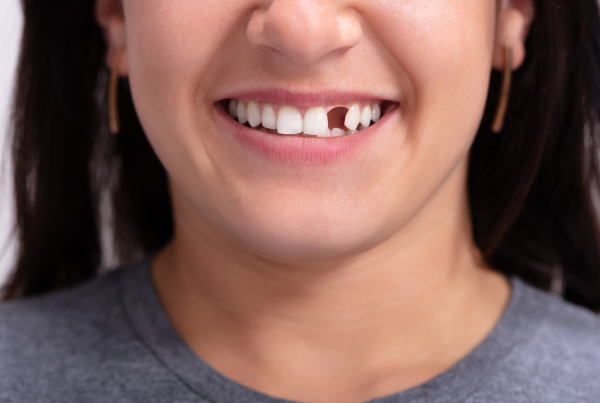Usually, sipping a cold drink or biting into an ice cream should be a pleasurable experience, but these treats can cause discomfort or a twinge of pain if you have sensitive teeth. The same sensations can also be experienced when eating or drinking anything hot, sweet, or acidic. Sometimes even breathing in on a crisp winter’s day can be painful. Tooth sensitivity is also called dentin hypersensitivity and could be a temporary or more permanent problem. It can affect a single tooth or multiple teeth and may be due to several different reasons.
What Can Cause Tooth Sensitivity?
Teeth are covered with a protective layer of tooth enamel that helps prevent the sensations created by hot or cold foods from reaching the tooth nerve, right in the centre. Some people have thinner tooth enamel, which has worn away, a problem called enamel erosion. Erosion can occur if you brush your teeth too hard or use a hard-bristled toothbrush.
You can wear down your tooth enamel if you grind and clench your teeth at night, a problem called bruxism, or if you regularly consume acidic foods and beverages or foods that are very sweet and sticky, feeding harmful bacteria that produce acid as a side-effect. Gastroesophageal reflux (GERD) causes strong stomach acid to come into the mouth and may wear down tooth enamel over time.
Untreated tooth decay or any chips or cracks in teeth will expose the dentin, allowing sensations created when you consume hot, cold, sweet or sour foods to reach the tooth nerve easily. Where this is the case, tooth sensitivity will most likely only affect one or two teeth.
If you have recently received dental care or have used teeth whitening products, it can take a while for teeth to settle down afterwards. The sensitivity should subside within a few days.
Gum recession can be caused by brushing your teeth too hard or by gum disease and exposes the tooth roots. Unlike your teeth, tooth roots are not covered in enamel and instead are coated with cementum, a much softer substance that is quickly eroded, exposing the dentin.
What to Do If You Have Sensitive Teeth?
If you have noticed your teeth are feeling more sensitive, and it has been a while since you had a dental checkup, it is a good idea to book an appointment here at Tsawwassen Place Dental. A checkup will discover why your teeth feel sensitive and if dental treatment is needed to reduce tooth sensitivity and protect your teeth. Our dentists, Dr. Sarah Harland or Dr. Tom Greene, can soon evaluate your dental health and determine the cause for tooth sensitivity. They can check for any signs of cavities or other symptoms of dental disease and check the condition of any restorations in case you have a loose or crumbling filling or crown. If needed, they will take dental x-rays to look for signs of disease or damage to a tooth not visible to the naked eye.
After examining your teeth, Dr. Harland or Dr. Greene can discuss suitable ways to reduce tooth sensitivity. Possible treatments may include filling untreated cavities or replacing ageing restorations. If you have signs of bruxism, you may need a custom night guard. Often, bruxism is a nocturnal habit and wearing a nightguard will prevent clenching and grinding. Your GP can prescribe medications to treat GERD.
It may also be worth reviewing your oral care routine to ensure you don’t brush your teeth too hard but brush effectively. Using toothpaste designed specifically for sensitive teeth can be helpful, as it contains ingredients that help to block unpleasant sensations from reaching your tooth nerve. The effect is cumulative and builds up over several weeks, so you need to continue using the toothpaste to get the full benefits.





